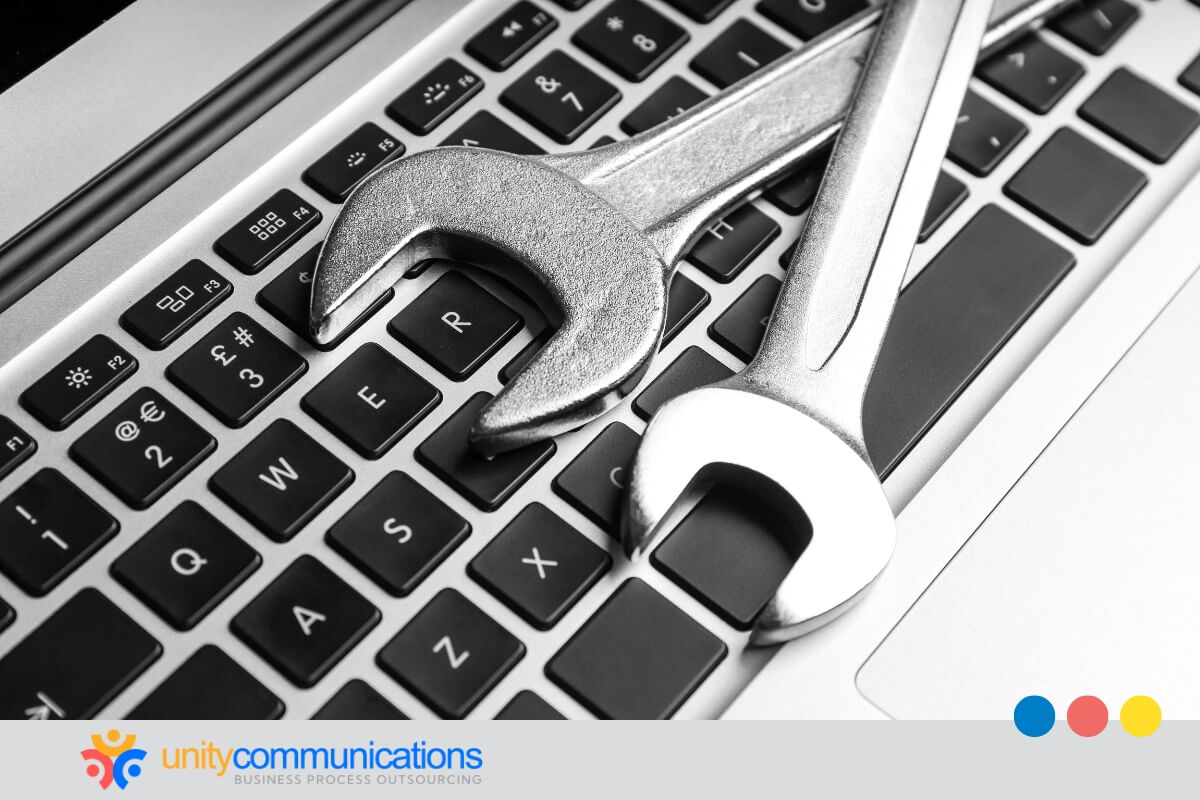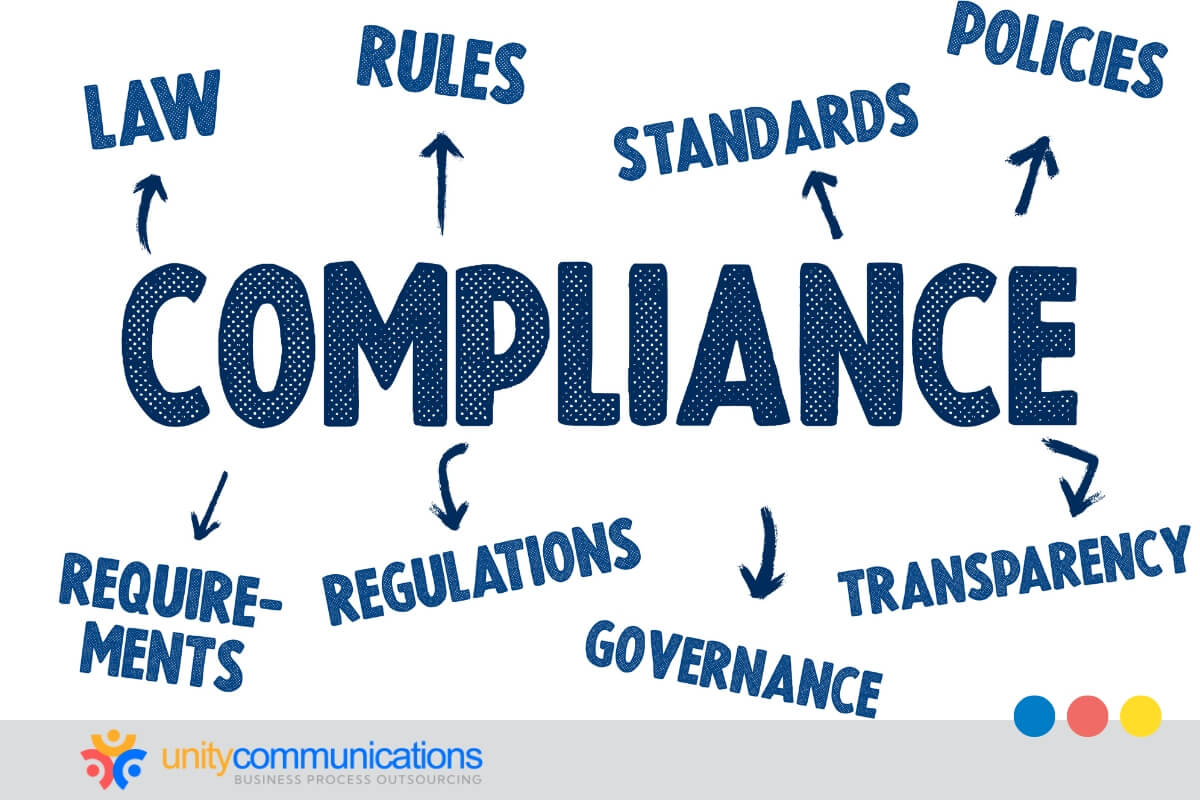Table of Contents
Data security has become even more critical in healthcare due to the industry’s growing reliance on virtual medical assistant (VMA) support. VMAs integrate into healthcare operations, interacting with and managing sensitive patient information.
Providers must implement robust security measures to protect data against potential breaches. Inadequate encryption and security protocols could allow VMAs to inadvertently expose patient records without proper safeguards.
This article explores the relationship between virtual assistants and healthcare data security, highlighting how establishing stringent protocols safeguards patient confidentiality in VMA interactions.
Engaging virtual medical assistants through outsourcing

Business process outsourcing (BPO) has emerged as a viable strategy for accessing top virtual talent. But what is BPO? It is the practice of delegating non-core functions to external teams for improved operational efficiency and better focus on core competencies.
In BPO in telemedicine, outsourcing vendors deploy virtual medical assistants as an extension of the internal staff. They manage the following activities to let healthcare practitioners prioritize more critical tasks:
- Patient scheduling and coordination: Virtual assistants manage patient appointments by scheduling, sending reminders, and coordinating follow-ups to ensure smooth and timely care.
- Medical records management: They update, organize, and maintain the accuracy, comprehensiveness, and timeliness of patient data.
- Billing and insurance processing: VMAs handle claim processing, manage payments, and verify insurance details to streamline financial transactions and billing procedures.
- Patient outreach and education: They provide essential pre-consultation instructions and post-care guidance, help patients understand their treatment plans, and improve patient engagement.
- Technical support: Virtual assistants help patients and healthcare providers navigate telemedicine platforms and troubleshoot technical issues so they can use the technology effectively.
As practices continue outsourcing administrative tasks in healthcare to virtual assistants, they must also observe data security in VMA activities to retain operational excellence and patient satisfaction.
Identifying potential vulnerabilities
Virtual assistants and healthcare data security go hand in hand. VMAs handle sensitive data, from patient records and appointment schedules to billing information and communication logs.
As VMAs manage data online, they might introduce vulnerabilities. The most common risks include data breaches, phishing attacks, and unauthorized access. These can compromise patient privacy and the integrity of healthcare operations.
Suppose a hospital hires a virtual assistant for Phoenix healthcare. Here are issues the hospital must watch out for when working with the VA:
- Data breaches: Unauthorized access to patient records can occur if encryption methods are weak or security protocols are insufficiently implemented.
- Phishing attacks: The virtual assistant might inadvertently fall victim to fraudulent emails or messages, which could lead to unauthorized access to the healthcare system.
- Unauthorized access: If proper authentication measures are not in place, sensitive data might be exposed to unauthorized individuals and compromise security.
Robust cybersecurity practices for the healthcare process in BPO protect against these vulnerabilities and keep patient data secure.
Complying with healthcare regulations
Strict regulations govern the healthcare industry to protect patient information, especially the Health Insurance Portability and Accountability Act of 1996 (HIPAA). Understanding and adhering to HIPAA requirements is crucial for practices utilizing virtual assistants to maintain healthcare data security.
Here are the regulatory requirements under HIPAA:
- Confidentiality: Ensuring that patient information is accessible only to authorized individuals, including virtual assistants, to prevent unauthorized disclosure.
- Integrity: Protecting data from being altered or tampered with during storage and transmission to maintain accuracy and reliability.
- Availability: Guaranteeing that patient data is readily accessible when needed while preventing unauthorized delays or restrictions.
- Audit controls: Implementing mechanisms to record and examine access to electronic health information, tracking and documenting interactions for accountability.
- Risk management: Regularly assess and mitigate potential risks to patient data, especially within healthcare operations, to ensure ongoing protection.
- Business associate agreements (BAAs): Establishing contracts between healthcare providers and virtual assistant services to enforce compliance with HIPAA regulations and foster mutual understanding of data security responsibilities.
- Training and awareness: Providing ongoing education to staff and virtual assistants about data security best practices, including secure password management and recognizing phishing attempts.
- Incident response planning: Developing and maintaining a response plan to quickly address and manage data breaches or security incidents, minimizing potential damage and recovery time.
Regulation compliance helps healthcare providers protect patient data while meeting their legal responsibilities. It safeguards against potential breaches and fosters trust between patients and providers.
By understanding how outsourcing works within the healthcare context, providers can collaborate with their BPO partners to better align their virtual assistant services with regulatory requirements and uphold the highest standards of patient care.
Implementing robust security measures

Robust security measures keep data secure and confidential in VMA interactions. Here are essential strategies for protecting patient data:
- Encryption: Use strong end-to-end encryption to protect data in transit and at rest to make patient information inaccessible to unauthorized parties.
- Data storage: Implement secure solutions with access controls to safeguard sensitive information from unauthorized access or breaches.
- Regular security audits: Conduct regular security audits to identify and address potential vulnerabilities so all security protocols remain effective.
- Reputable VA services: Choose virtual assistant services that prioritize data security and comply with industry standards, offering comprehensive protection for patient information.
Data protection upholds trust in the healthcare provider, fosters patient loyalty, and maintains adherence to regulatory standards. Practices must also ensure virtual assistants participate in healthcare data security initiatives for total protection.
Training and awareness programs
Both internal professionals and outsourced virtual assistants must be well-trained in the best practices in healthcare data security. As their collaboration increasingly becomes the norm, they must understand how to protect sensitive patient information and prevent security breaches.
Proper training reduces the risk of unauthorized access and data loss. Training topics must include the following:
- Secure password practices: Creating and maintaining strong, unique passwords is essential, and regularly updating them helps protect against unauthorized access and potential breaches.
- Recognition of phishing attempts: Identifying suspicious emails, links, and communications is crucial to avoiding attacks that could compromise sensitive data.
- Safe data sharing protocols: Patient information shared with virtual assistants must be transmitted through secure, encrypted channels to prevent unauthorized access and data leaks.
- Access control measures: Limiting access to sensitive data based on the virtual assistant’s role and responsibilities ensures that only authorized individuals can view or handle critical information.
- Regular security training: Providing ongoing education and training for staff and virtual assistants about the latest security threats and best practices maintains vigilance and protects patient data.
- Multi-factor authentication (MFA): Applying MFA technology to healthcare security requires users to take additional verification steps beyond a password. It reduces the risk of unauthorized access.
Healthcare providers can build a robust security culture by focusing on these areas and allowing the staff and virtual assistants to operate within safe boundaries.
Monitoring and continuous improvement
Ongoing security protocol monitoring maintains patient data integrity, especially while working with VAs through healthcare BPO services. Regularly reviewing how virtual assistants interact with sensitive information allows organizations to identify and address vulnerabilities proactively.
Incorporating security incident reporting and analytics allows healthcare organizations to continuously adapt and refine their data security strategies against emerging threats.
The steps for effective monitoring and improvement include:
- Real-time monitoring: Implementing tools that provide continuous oversight of virtual assistant activities allows for the immediate detection and response to suspicious behavior and timely intervention.
- Security incident reporting: A clear and systematic process for reporting and analyzing security incidents ensures that any breaches or attempted breaches are documented, addressed, and used to inform future measures.
- Data analytics: Data analytics helps identify patterns or anomalies in virtual assistant interactions, enabling organizations to predict and prevent security risks before they escalate.
- Regular audits: Conducting periodic audits of security protocols ensures they remain effective and compliant with current standards, allowing for necessary adjustments to address emerging threats.
- Vulnerability assessments: Regularly performing vulnerability assessments to identify and address security infrastructure weaknesses can promptly mitigate gaps.
- Incident response planning: Developing and maintaining a comprehensive incident response plan enables a quick and organized reaction to security breaches, minimizing impact and facilitating effective recovery.
By maintaining a monitoring cycle and continuous improvement, organizations can stay ahead of threats and ensure that their data security measures are always up-to-date.
Selecting the best virtual assistants for healthcare data security

When choosing the right virtual assistant, healthcare providers must consider familiarity with security practices and commitment to compliance. Adhering to data security practices helps safeguard patient data and upholds the integrity of business operations.
Below are critical considerations to include in the selection process:
- Understanding of data security protocols: Ensure the virtual assistant knows encryption, secure data handling, and confidentiality requirements.
- Experience with compliance standards: Look for candidates familiar with HIPAA regulations and understand their role in maintaining compliance.
- Commitment to ongoing training: Choose virtual assistants who actively participate in training and stay updated on the latest security threats and best practices.
- Track record of reliability: Verify the virtual assistant has a history of responsibly handling sensitive information and demonstrating a solid data protection commitment.
- Proficiency with security tools: Choose a virtual assistant skilled in using security tools and technologies that protect data and maintain secure communications.
- Strong communication skills: Pick virtual assistants who can effectively communicate security protocols and concerns and maintain precise and secure interactions within the team.
Healthcare providers must work closely with their BPO partners during the selection process to ensure that their virtual assistants promote a secure and compliant healthcare environment.
The bottom line
Working with virtual assistants and practicing healthcare data security are crucial. Providers must help VMAs protect sensitive patient information and comply with legal standards. Although virtual assistants can significantly enhance efficiency and improve patient care, safeguarding data must remain a top priority to mitigate cyber threats.
Stay proactive in your approach to data security to protect your patients and your practice. Review and strengthen your security protocols. Let’s connect!




